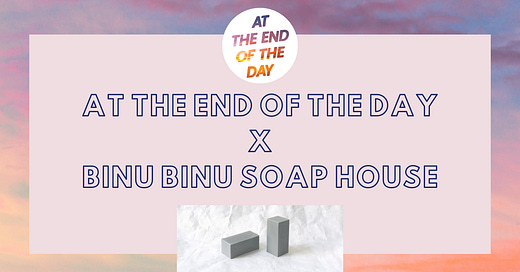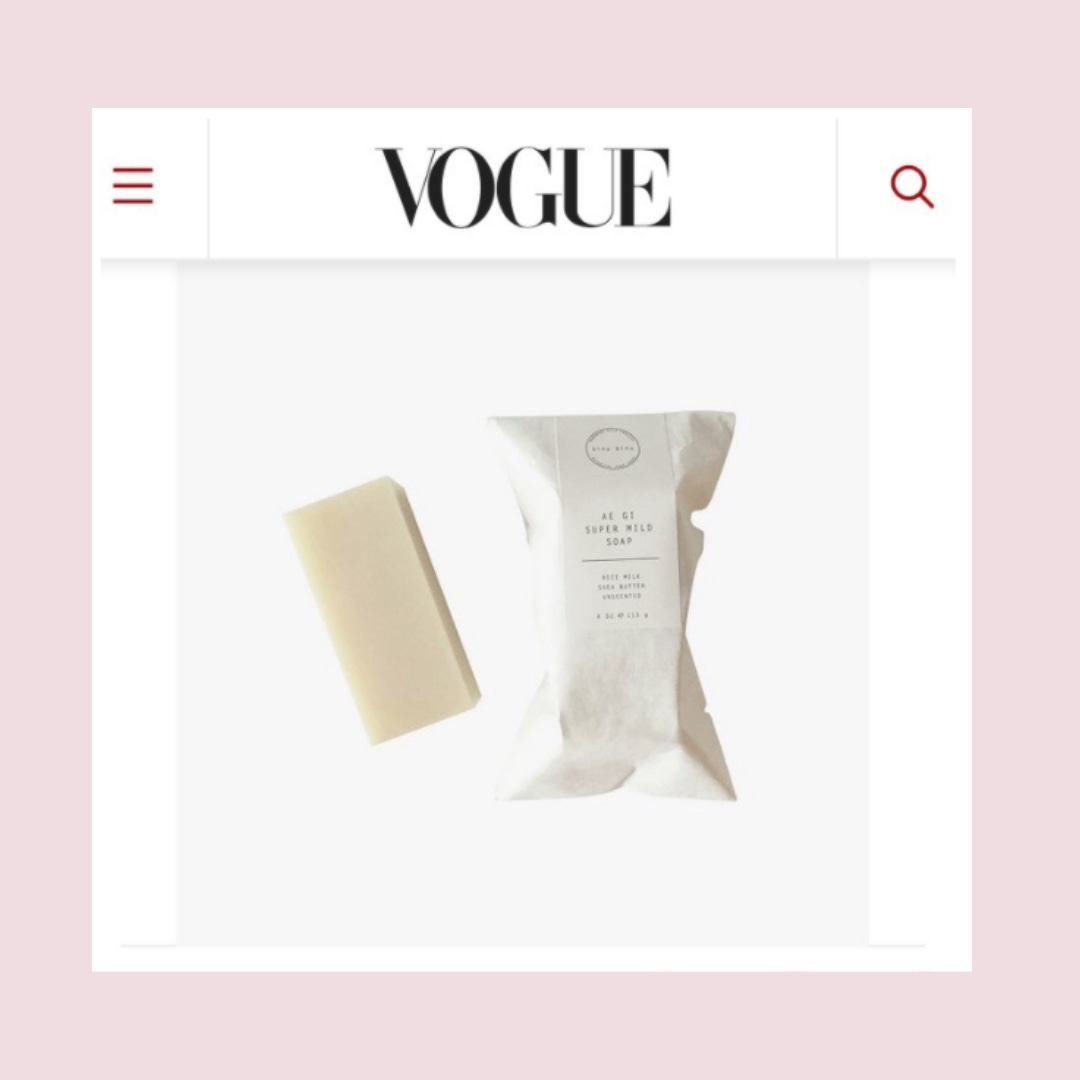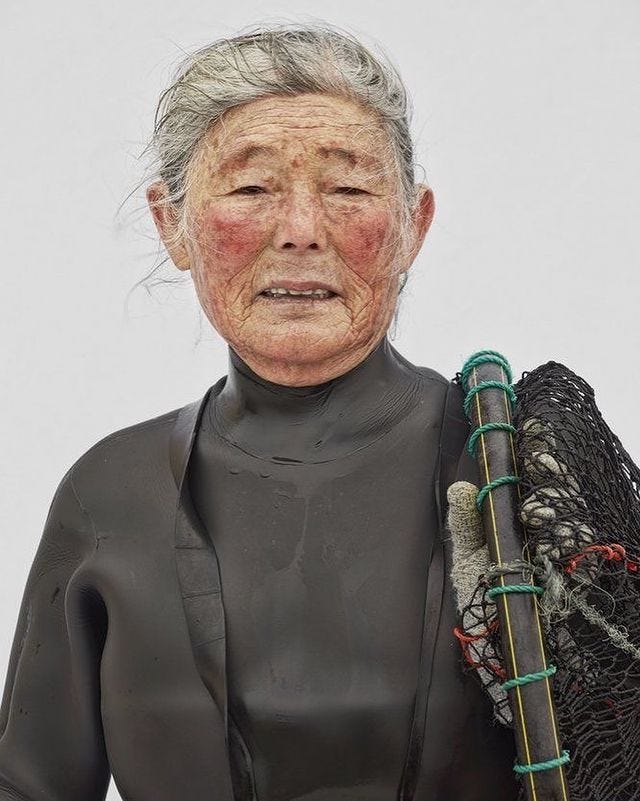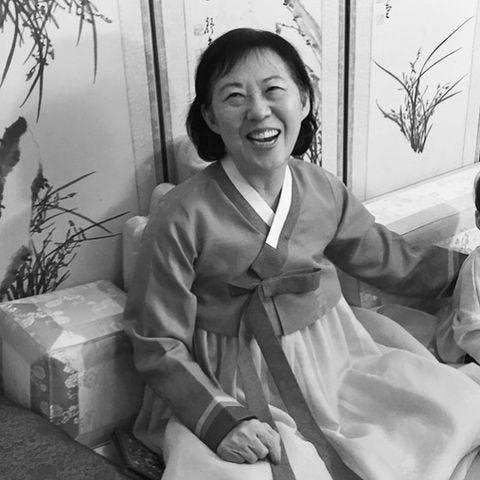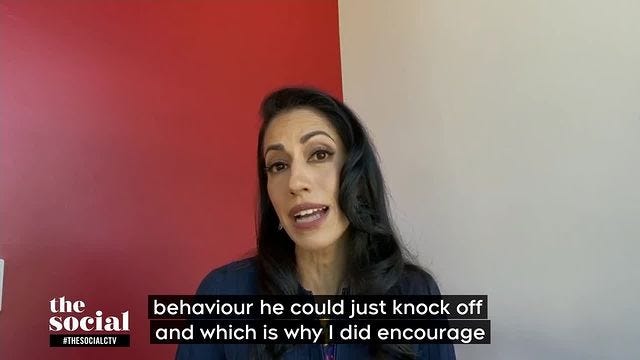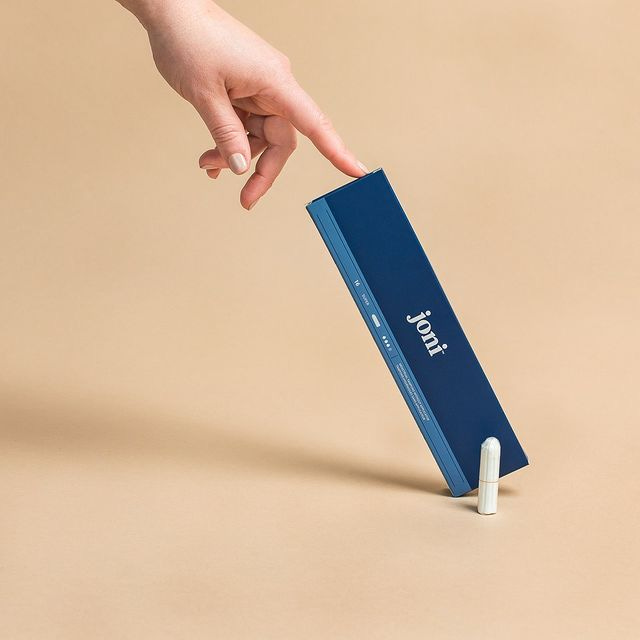
Discover more from At The End Of The Day
Welcome to At The End Of the Day. I’m Hannah Sung and I write this newsletter for a people-first perspective on the news.
If you’ve been thinking about becoming a patron of ATEOD, let this be the week! Be one of the next 25 people to sign up to my Patreon and you’ll score one Seshin Korean bath scrub mitt from Binu Binu Soap House. I love these — use one in the shower and you will emerge as smooth as a soft-boiled egg.
Everyone has that one friend who has done something you can’t stop thinking about. One thing that inspires you to do something similar.
For me, that’s Karen Kim of Binu Binu Soap House.
She has built a business making gorgeous soap, skincare and bath products inspired by Korean bath culture.
If you want a cleanly objective take on her business, you can stop reading right here. Because today, I’m basically writing a fan letter to my friend’s work — the entrepreneurship, the deep thoughtfulness of it, her craft — and I’m sharing it with you because Karen’s company is what inspired me to funnel my own energies into creating At The End Of the Day.
Karen Kim of Binu Binu Soap House
Karen and I met in our early 20s when I worked at MuchMusic on Queen Street West in Toronto and she worked across the street at Aritzia. I had wandered in on my lunch break and we struck up a conversation and became bona fide friends.
We kept in touch, worked our careers (her fashion career took her to Vancouver and New York) before we each had kids, she came home to Toronto and we found each other again.
Haenyo Sea Woman Soap, Binu Binu Soap House
When Karen launched Binu Binu six years ago, I’d never seen soap like it.
I’ve always admired her soaps for their status as an everyday objet, one that you can use and enjoy and is ephemeral in nature. What’s been gratifying to witness is how Karen has taken something that one could consider mundane (how many times a day do you use soap?) and elevated it to be a conduit for exploring self, culture and imbuing everyday life with deeper meaning. That’s what I truly love most about Binu Binu.
Fancy fashion people love it, too. Binu Binu has been a darling of Vogue and the New York Times since the very beginning. I would have loved it anyway, but it’s so great to see your friend’s killer aesthetic and hard work get the industry nods of confirmation.
When your friend’s work is in Vogue, you celebrate 🎉
I talked to Karen about starting Binu Binu and how a trip to Korea during her 20s sparked the inspiration.
Talking to Karen Kim of Binu Binu
HS: Can you tell me the origin story of your soap company?
KK: I always had a career in fashion but I wanted to do my own thing. I took a workshop to learn how to make soap and came up with the name Binu Binu, which is the Korean word for soap but doubled up, and I began tying together memories of soap. I thought of my trip to Korea with my mom, where we would go to the jjimjilbang, the Korean bath house, every day with my four aunts.
HS: Wait — you used to go every day?
KK: Pretty much every single day. The whole trip was about 12 days. We'd wake up and have a massive Korean breakfast with like, 10 million different banchan. And then we'd go to the bath house.
HS: And can you describe the jjimjilbang?
KK: It wasn't what you would think of as a spa in North America. It was just a modest building. You go in, there's a shower area and you strip completely naked. I was like, What? I remember saying, “Okay, Mom, by the way... I have a tattoo.” I gave her a two-second warning.
HS: Oh my god.
KK: And so you go into the jjimjilbang, you do a pre-shower. There's bar soap there. It's very no frills. And then you go to the hot baths, cold baths, sauna room. It's all women. Once you take off your clothes, you get over yourself really quickly. No one's even looking at you. And there is such a sense of relaxation that that brings about, you know? You're like, I'm okay. You're okay. We’re just people.
HS: We are just people who have bodies.
KK: Yeah, exactly. At first when I started the company, I was really into the idea of representation. Like, I wasn’t going to try to be a French soap brand. So I made references to not just the Korean bath house, but other parts of Korean culture.
There's the influence of the jjimjilbang. And there’s also the idea of being an anti-luxury beauty company, you know?
HS: Anti-luxury?
KK: Yeah, like, as opposed to North American spas, which are about pampering and luxury and “me time.” To me, the bath house wasn’t “me time,” but “us time,” which is, of course, a form of self-care too. It’s community care. It just felt way less pretentious. And I loved that.
I took inspiration from that trip with my mom and my aunts. That trip was very much about female empowerment. The purpose of the trip was for all the women in the family to band together and confront the eldest brother about settling the inheritance fairly amongst all the women siblings, because in Korea it just all goes to the firstborn son.
HS: I didn't know that.
KK: Yeah. There was this moment, we were riding in this van being driven by my cousin. And I just taking in this group of elderly ladies, huddled in the van with me, on our way to my mom's old fishing village hometown. And they were talking excitedly and put their hands together, like a sports team, cheering and yelling, to pump themselves up about their mission. It was so exciting. And I take inspiration from the energy of that moment.
I wanted to start a beauty company that wasn't really rooted in trying to make yourself “be more beautiful.”
HS: What I love about your Instagram is when you post haenyo [Korean women free divers, a traditional way of gathering food]. I thought, These are images of extreme strength and beauty that I would never see anywhere else, at least not in a “beauty” context. You only see these kinds of images as historical reference. There's no throughline to a contemporary understanding of like, Yes, I look like that. And that is beauty. I just love that.
KK: We have a soap that's called Haenyo Sea Woman soap, which is named after the haenyo sea women who are part of the matriarchal structure of Jeju Island [a small island in Korea].
And it's the opposite of what you hear about Korea being a patriarchal society.
HS: I think that is my favorite soap of yours.
KK: Then we have this other soap called Shaman Soap. I learned that Korean shamans are predominantly female. It’s a job that is generationally passed down from mothers to their daughters. It’s just so cool that women have this power that’s innate to them that no one else has.
HS: What makes a shaman a shaman?
KK: It’s generational, a calling that’s often passed down from mother to daughter. They are a bridge between humans on Earth and the spiritual world. It’s an old, traditional job but they’re still around today. You can call a shaman and ask for advice on health or finances or your love life.
HS: Many of your life experiences have informed your business. I'm wondering how much of it was planned and how much of it was discovering yourself as you went?
KK: A lot of it was the latter. I’m the type of person who plans meticulously. I’m cautious. But starting a business is such a huge thing — you don’t know what you don’t know. There’s only so much planning you can do.
HS: What guides you if it isn’t a plan? Do you have a philosophy?
KK: I mentioned that I started with the idea of representation, but it was 2015 and that’s pretty low-hanging fruit. Representation is just being a Korean Canadian woman and stating yourself as such. That, to me, was a big step. But here we are in 2021. And I feel like it needs to be so much more than representing and just being here.
You know, it's a familiar story — you grow up, you kind of reject being Korean, or Asian or “other,” whatever ethnicity you are that isn't white. And now, I'm desperate to explore and uncover that and speak about it. I know that other people are in the same sort of situation, too. So what guides me today is thinking about other people like me, and hoping to connect in some way.
HS: Do you get fan mail?
KK: Yeah, I get nice messages on Instagram, people thanking me. What makes me happiest is to hear when people say they can tell how much thought and care and exploration goes into everything.
Taking inspiration from a friend
It was watching Karen explore her own entrepreneurial creativity that spurred me to follow my own path with this newsletter.
I could never have thought that soap could take you to such thoughtful places. And now I’m on my own journey, too!
Having a supportive, encouraging friend made me a little less afraid of doing this. I’m grateful to Karen for showing me, someone I had thought of as a fairly un-business-savvy journalist, to not be afraid of building a business.
ATEOD x Binu Binu giveaway
And now we are doing a giveaway together! Here are three ways you can get your hands on something to make your next bath really special.
⭐ Win a Binu Binu Box Set (five-bar gift set, value $110 USD)
Hit reply to this email with “BINU” in the subject line. Cc: a friend for double the chance to win. The contest is open to subscribers of At The End Of the Day newsletter. To enter, you must be located in Canada. Winners will be notified by the end of the week. Contest closes Tuesday, November 16 at 8 pm ET.
⭐ Pay-what-you-wish to support this newsletter and receive a gift
If you have been on the fence about becoming a patron of this newsletter, pay-what-you-wish to support the work I do! The next 25 people to become patrons will receive a Korean scrub mitt (value $22 USD) courtesy of Binu Binu. Just follow the link to my Patreon.
⭐ Use the ATEOD10 discount code
When I’m looking for a gift, I love giving Karen’s soaps and incense (hydrangea is a fave). Treat yourself or your friend to something really nice! Get 10% off by using ATEOD10 at the Binu Binu website. Offer ends December 1, 2021 at 8 pm ET.
That’s it for me. It’s been a big work week as I continued guest hosting on The Social at CTV. I’ve been sharing that on Instagram.
Now I’m back to no make-up and working in my home office and it feels great. Hope you have the chance to take a breather this weekend!
Thank you for reading,
Hannah
✨✨✨ At The End Of the Day is edited by Laura Hensley ✨✨✨
P.S. Next week, we have a Gift Guide that Laura and I have put together for you and we are so excited to share it with you!
Further Reading
There's Lots of Blame to Go Around for Astroworld, But the Ultimate Responsibility Rests With Travis Scott, Friday Things
The pandemic is breaking parents, Maclean’s
The travelers who are turning their backs on airplanes, CNN
Huma Abedin Has Been to Hell and Back. Now She’s Gingerly Telling the Tale. New York Times
I had the pleasure of reading Huma Abedin’s book and interviewing her on The Social this week, here’s a tiny clip:
— Marketing with At The End Of the Day —
Get what you need
Do you know joni? They are a period care company based in British Columbia, Canada. And they’ve just added tampons to their growing list of period products.
You can get pads and tampons at any giant drugstore or supermarket. But how many companies have menstrual equity as a core value?
Let me give you a quick list of how joni is different:
🔴 When you make a purchase with joni, they donate pads to people and communities who need them
🔴 They’ve donated 100 000 pads (since launching March 2020)
🔴 Their pads are organic and biodegradable (traditional pads break down over 300 years and create microplastics)
🔴 They ship directly and shipping is free, bypassing the barrier of discrimination based on location (these supplies can be very expensive in some Indigenous communities)
🔴 They’re done with shame and stigma (and so am I – may the commercials I grew up with forever be retired as laughable relics on YouTube)
If you want to try them, use the discount code ATEOD15 for 15% off until December 31, 2021. Read more about why I love this company.
Subscribe to At The End Of The Day
A news perspective that puts people first -- relationships, caring, social fairness and the greater good

